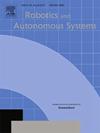基于奖励塑造和启发式的情景强化学习中机器人抽象的开发
IF 5.2
2区 计算机科学
Q1 AUTOMATION & CONTROL SYSTEMS
引用次数: 0
摘要
强化学习(RL)在许多实际相关领域的适用性的一个主要限制,特别是在机器人应用中,是学习最优策略所需的大量样本。为了解决这个问题并提高学习效率,我们考虑了目标域下马尔可夫决策过程(MDP)抽象层的线性层次。每一层都是一个MDP,表示层次结构中下一层的一个较粗的模型。在这项工作中,我们提出了新的技术来自动定义基于更高抽象层次获得的解决方案的奖励塑造和奖励启发式函数,并为较低层次的更精细(可能是具体的)MDP提供奖励,从而诱导出一种探索启发式,可以有效地指导更复杂领域的学习过程。与层次强化学习中的其他工作相比,我们的技术对抽象模型的设计要求更少,并且可以容忍建模错误,从而使所提出的方法具有实用性。形式化地分析了抽象模型与低级域探索启发式之间的关系,证明了该方法保证了最优收敛,最后在多个复杂机器人域实验中验证了其有效性。本文章由计算机程序翻译,如有差异,请以英文原文为准。
Exploiting robot abstractions in episodic RL via reward shaping and heuristics
One major limitation to the applicability of Reinforcement Learning (RL) to many domains of practical relevance, in particular in robotic applications, is the large number of samples required to learn an optimal policy. To address this problem and improve learning efficiency, we consider a linear hierarchy of abstraction layers of the Markov Decision Process (MDP) underlying the target domain. Each layer is an MDP representing a coarser model of the one immediately below in the hierarchy. In this work, we propose novel techniques to automatically define Reward Shaping and Reward Heuristic functions that are based on the solution obtained at a higher level of abstraction and provide rewards to the finer (possibly the concrete) MDP at the lower level, thus inducing an exploration heuristic that can effectively guide the learning process in the more complex domain. In contrast with other works in Hierarchical RL, our technique imposes fewer requirements on the design of the abstract models and is tolerant to modeling errors, thus making the proposed approach practical. We formally analyze the relationship between the abstract models and the exploration heuristic induced in the lower-level domain, we prove that the method guarantees optimal convergence, and finally demonstrate its effectiveness experimentally in several complex robotic domains.
求助全文
通过发布文献求助,成功后即可免费获取论文全文。
去求助
来源期刊

Robotics and Autonomous Systems
工程技术-机器人学
CiteScore
9.00
自引率
7.00%
发文量
164
审稿时长
4.5 months
期刊介绍:
Robotics and Autonomous Systems will carry articles describing fundamental developments in the field of robotics, with special emphasis on autonomous systems. An important goal of this journal is to extend the state of the art in both symbolic and sensory based robot control and learning in the context of autonomous systems.
Robotics and Autonomous Systems will carry articles on the theoretical, computational and experimental aspects of autonomous systems, or modules of such systems.
 求助内容:
求助内容: 应助结果提醒方式:
应助结果提醒方式:


